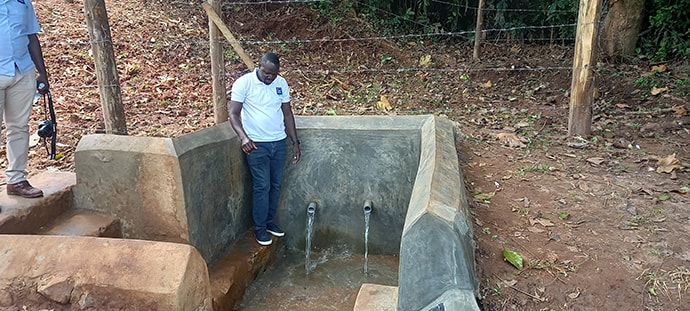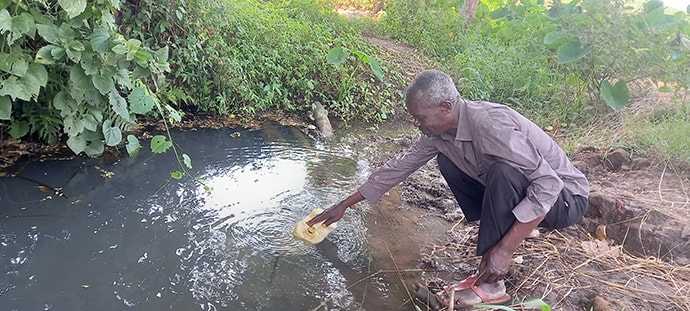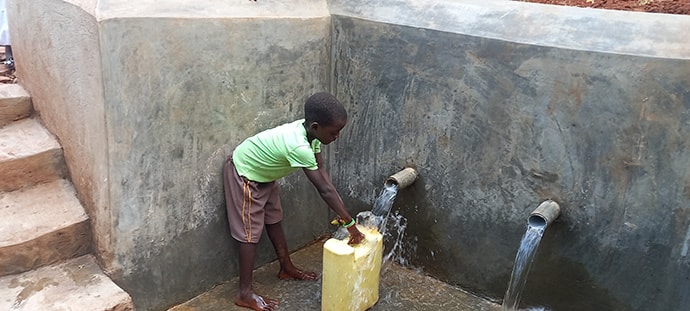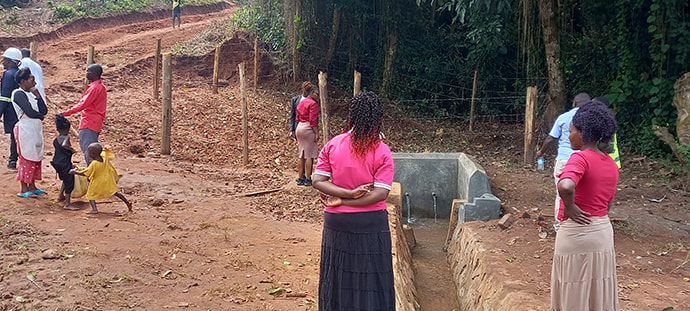
Ibrahim Ogaram at one of the THP constructed community wells. Photo: THP
The Hunger Project (THP), a GlobalWA member since 2018, was founded in 1977 with the goal of ending world hunger. They have ongoing programs in Africa, Asia, and Latin America aimed at mobilizing rural grassroots communities to achieve sustainable progress in health, education, nutrition, and family income. WASH is one of those activities and it is one of the foundations for community health.
THP is exemplary when it comes to the training and empowerment of local actors in communities where they work, and we had the honor of being connected to one of their local WASH and nutrition specialists, a local Ugandan who is a dedicated Food Security and Nutrition Officer with over 12 years of experience in livelihoods, nutrition, and WASH (Water, Sanitation, and Hygiene) practices.
Hello and welcome, Ibrahim. Thank you so much for being willing to talk with us today. Please introduce yourself to our audience…
Thank you very much, Joel. My name is Ibrahim Ogaram from The Hunger Project Uganda. I work as a program officer for Food Security and Nutrition. I’m very passionate about our nutrition project, which includes several thematic areas, one of which is WASH.
This is now my sixth year with The Hunger Project, Uganda. Previously, I worked on an agriculture project that supported organic production without harsh chemicals. Now, I am focused on our nutrition project, which integrates WASH as a key component. Our WASH program focuses on sanitation and training around health and nutrition.
What or who in your upbringing and early professional career drove you to work in community development and WASH activities?
From the time I graduated in 2008, I started working with communities in gardening, where WASH was a priority. Seeing communities improve their hygiene, sanitation, access to clean water, and waste management fueled my passion.
The most interesting thing about WASH is that, when I relate what happened in 2008 to during the COVID time, I realize that the handwashing practices we promoted back then proved crucial during the COVID-19 pandemic, highlighting the importance of WASH. If all the communities in the entire world followed the same procedures automatically, they would even have less or no infection, as compared to the time of COVID-19.
Did you start off in your local community where you grew up? Or was this just where you happened to be living at the time?
My first job took me to a different community in another district, where I worked with 25 communities transferring information and knowledge of WASH as well as other thematic areas. But the emphasis wasn’t on WASH. When I joined The Hunger Project, I was pleased to continue similar work with new communities. What I was doing with the different communities previously is the same that I’m doing with these other communities through The Hunger Project. It is a very natural fit.

Shallow well used by the community before spring well were constructed by THP-U. Photo: THP
How did you hear about and come to work for The Hunger Project?
Before I joined The Hunger Project, I used to hear about them through the work they do, because one of my neighboring districts where I come from The Hunger Project was working there, so I used to hear about them through the communities they were working with. I also heard of The Hunger Project through radio stations and TV broadcasts. Then, when they advertised for jobs through newspapers and some social media platforms, I got to understand The Hunger Project further and also applied. Luckily enough, I succeeded on my first attempt and joined The Hunger Project Uganda.

Constructed community spring wells by THP-U. Photo: THP
What is The Hunger Project’s approach or philosophy regarding water access, sanitation, and hygiene?
THP emphasizes community engagement and responsibility. One of the ideas that I learned is, for example, when you’re working on a community water source, it’s not your responsibility to take charge of the water source, but engaging the community to take full responsibility for the water source that is serving them is key, and I see it working so well. For example, with the still water sources, we established water user committees to manage local water sources, ensuring the community takes ownership of maintenance and protection. The committee members are the people fully responsible for taking charge of the water source in terms of cleaning and repairs, terms of protecting it, and so on. To me, it’s really a very great philosophy.
Tell us about some of the projects you’ve been working on – what have you been most excited about?
My very first project with The Hunger Project focused on agroecology and organic farming, which was very fulfilling due to its positive impact on human health. The agroecology project, focused on no use of chemical synthetic fertilizers. We know very well that chemicals and synthetic fertilizers, most of them are causes of human cancers, causes of actual illness to humanity. I saw it as a very exciting project and a pro-community project. The community comes together, producing their own healthy food, and nursing the seeds for planting or regeneration.
Currently, I am excited about our nutrition project, which supports numerous schools and health facilities by improving their access to water and handwashing facilities. This project is dear to my heart because of the number of people it supports are mostly schools. Through this project, we educate and train school children on the importance of handwashing. It is exciting to visit to monitor and witness the impact being made by these supports to the communities. It makes me feel very happy that your hard work is working very well for the community.
How does THP leverage partnerships or collaborations to help their WASH initiatives?
Collaboration is key to addressing WASH comprehensively. As an organization you may not be in a position to do everything about WASH in the community because WASH is a very wide subject that touches on health, water, waste management etc. But you realize that we work with various organizations that focus on different aspects of WASH, such as constructing latrines, providing water facilities, and promoting handwashing to ensure holistic solutions. Collaborating, you find yourself handling WASH holistically in all areas because we know WASH is a very wide subject – that is on health, that is on water, that is on waste management. If you work collaboratively, you find it is handled holistically.

A THP constructed community well. Photo: THP
When looking at the current challenges of climate change, shifting politics, people being forcibly displaced in record numbers… what are you most concerned about?
Climate change has negative impacts on WASH activities. For instance, floods can cause widespread contamination by bringing pollutants and waste into communities, leading to outbreaks of waterborne diseases. On the other hand, droughts result in water scarcity, forcing communities to rely on unsafe water sources. Additionally, strong winds can carry dust and debris that contaminate water supplies and create health hazards.
Then, when you come to politics, political instability and displacement disrupt communities’ access to WASH facilities, exacerbating these issues. These challenges are significant threats to our work. If there’s de-stability in a given country or in a given community, you find people moving from one place to another. They may reach a community where there are no facilities for WASH, like there are no pit latrines, there are no bus shelters, and there are no sources of water. You find such a community getting so much affected as a result of lack of security in a given country. For me, as a WASH specialist, I wouldn’t wish such circumstances to occur in a given country or in a given community.
What’s next for you – are you going to continue with WASH?
I am passionate about WASH and consider it an integral part of my life’s work. In every community I visit, even if my primary purpose is different, I always make it a point to address WASH issues. For example, I often demonstrate how to construct and use simple, low-cost solutions like local pedal tippy taps, which are crucial for promoting handwashing and hygiene. These small actions can have a significant impact, as they are easy to implement and maintain using locally available materials.
Looking ahead, I aspire to become an international expert in WASH. My goal is to expand my reach and share my knowledge and experience with a broader audience. I want to work on larger projects that tackle complex WASH challenges and contribute to global initiatives aimed at improving water, sanitation, and hygiene practices. I believe that by continuing to innovate and collaborate with other professionals and organizations, we can create sustainable solutions that benefit communities worldwide.